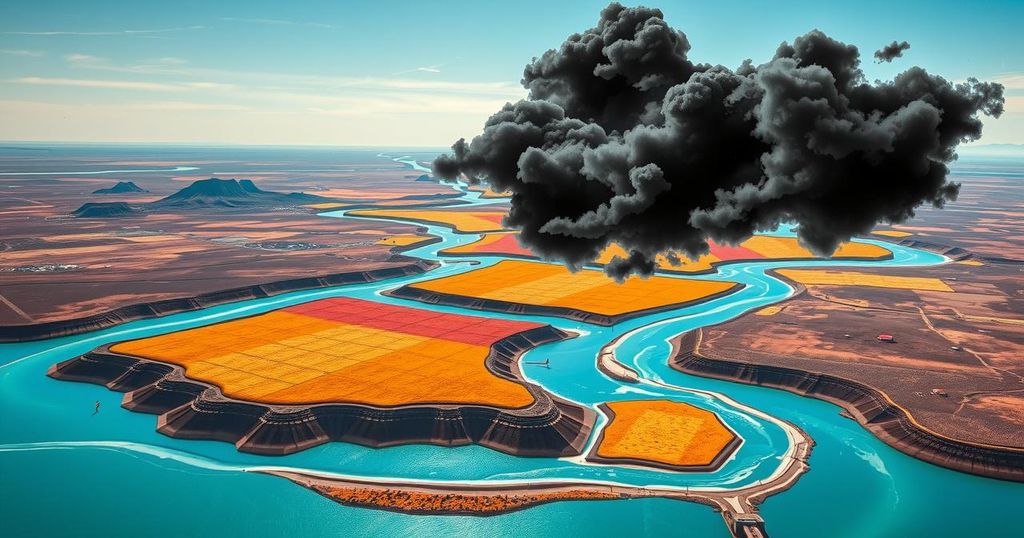The M23 rebel group has seized control of Goma, igniting a severe humanitarian crisis in the DRC, where millions suffer due to conflict over valuable minerals. The situation is exacerbated by historical strife stemming from the Rwandan genocide. Global indifference and anti-Blackness contribute to the lack of attention, with appeals for advocacy from public figures gaining urgency in light of the crisis.
The Democratic Republic of the Congo (DRC) is currently experiencing one of its most severe humanitarian crises. The M23 rebel group, backed by Rwanda, has taken control of Goma, the largest city in the eastern DRC, exacerbating a long-standing conflict rooted in identity, power, and resource disputes. Goma plays a critical economic role as a hub for mining operations that supply gold, tin, and coltan, essential for modern technologies like smartphones and electric vehicles.
As violence escalates, millions of Congolese civilians are trapped in the conflict over the region’s mineral wealth, particularly cobalt and coltan, which generate substantial profits. “This is a war over resources,” states independent journalist Shauntelle Boyer, emphasizing the historical exploitation of Congo’s riches that has persisted for decades, attracting outside interests and fueling war.
The M23 has reportedly controlled Rubaya, a critical coltan mining area, for over a year, generating significant income through taxation. The ongoing conflict, intensified by the group’s latest military advances, exacerbates the humanitarian situation in Goma, which is witnessing mass displacement and a dire shortage of resources. Thousands of displaced individuals are fleeing the city, already overwhelmed with prior waves of refugees.
The origins of this conflict intertwine with the aftermath of the 1994 Rwandan genocide, leading to an ongoing cycle of violence and displacement. Rwanda’s military involvement has been historically contentious, with recent statements from officials denying links to the M23, despite evidence suggesting their role in supporting the rebel group and smuggling minerals. A ceasefire brokered last year failed to stabilize the region, with renewed fighting occurring shortly thereafter.
Coverage of the DRC conflict has been alarmingly sparse on the global stage, highlighting deeper issues relating to anti-Blackness and a lack of empathy toward Black lives in crisis situations. Boyer argues that mainstream media often overlooks African conflicts while prioritizing others, further marginalizing relevant narratives and urgent humanitarian crises. On-the-ground independent journalists strive to raise awareness and bring attention to the suffering in DRC.
High-profile figures, including musicians and athletes, are urged to leverage their platforms for advocacy. Following the emergence of the conflict, artist Tems canceled a concert in Rwanda to acknowledge the severity of the humanitarian situation. In response to these developments, a special meeting has been called by the Southern African Development Community to address the escalating crisis in the DRC.
The Democratic Republic of the Congo is rich in valuable minerals but has been plagued by conflict and exploitation, exacerbated by foreign interests and local militias. The M23 rebel group has recently intensified its control over mineral-rich areas, highlighting the ongoing struggle for resources. Historical events such as the Rwandan genocide and subsequent Rwandan interventions in Congo continue to shape the current landscape of violence and instability, compounding the humanitarian crisis in the region.
The escalation of conflict in the DRC, particularly surrounding Goma, underscores a critical intersection of resource exploitation and humanitarian crises fueled by deep-rooted historical issues. The global response has been minimal, showcasing a troubling trend of neglect towards African conflicts. Advocacy from public figures and increased media attention is vital to address the situation and facilitate humanitarian support.
Original Source: www.newarab.com






